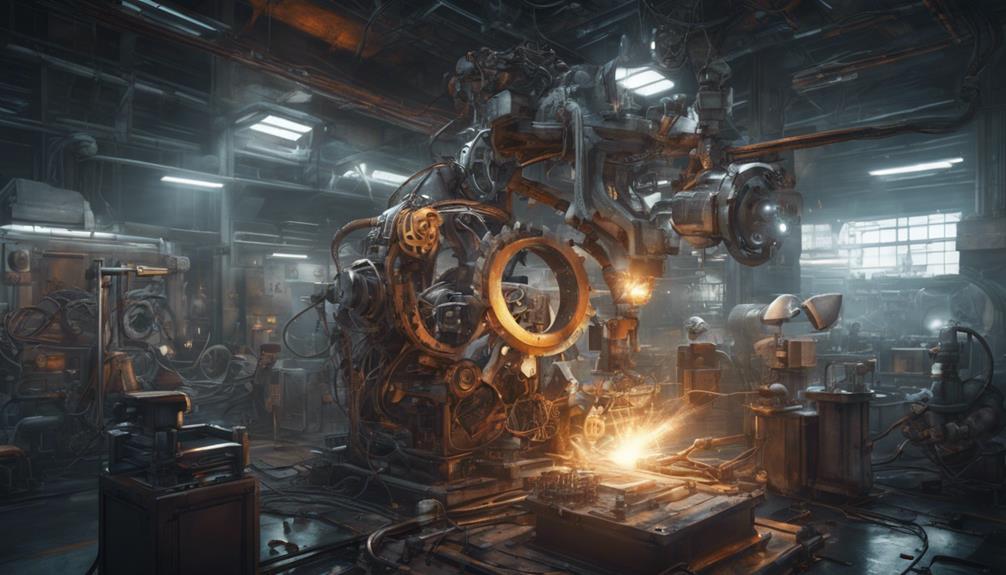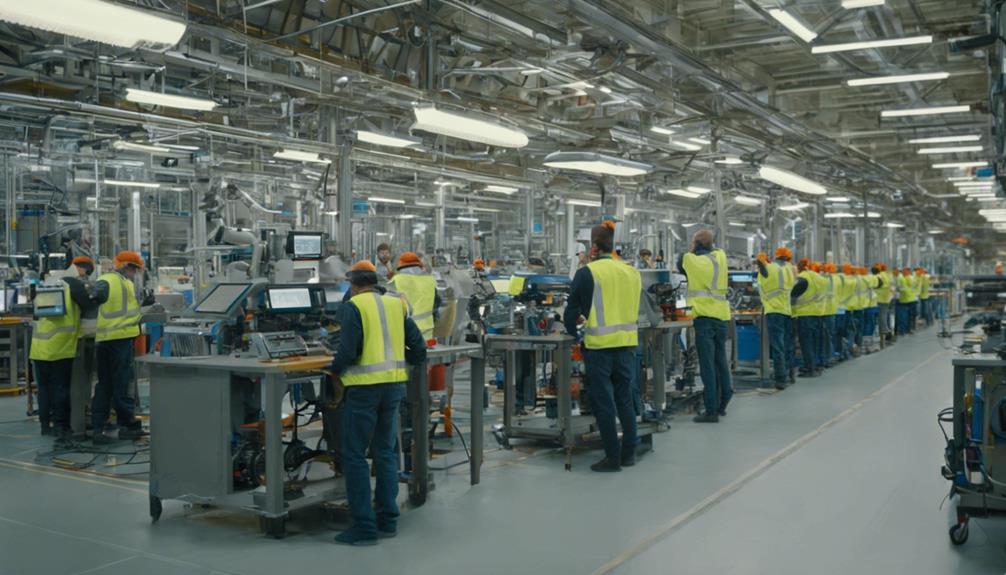Rush repairs are vital for industrial operations to minimize downtime, reduce revenue loss, and maintain efficiency. Every minute of unplanned downtime can result in significant financial losses and disrupt production schedules. By prioritizing urgent repair requests, leveraging quick turnaround times, and incorporating rush repairs into maintenance strategies, industrial operations can prevent prolonged periods of unproductive downtime and maintain operational efficiency. Additionally, proactive maintenance and timely repair of critical components can maximize uptime and reduce the likelihood of production delays. To optimize industrial operations and avoid costly disruptions, it is essential to understand the intricacies of effective rush repair strategies.
Key Takeaways
- Rush repairs minimize downtime, ensuring production schedules remain on track and reducing revenue loss due to unplanned stops.
- Swift restoration of critical equipment prevents prolonged periods of unproductive downtime, maintaining operational efficiency.
- Prioritizing urgent repair requests and implementing rush repairs helps prevent production delays and maximizes uptime.
- Timely repair and restoration of critical components, such as PCBs, reduce downtime and maintain productivity and profitability.
- Proactive maintenance through rush repairs reduces unexpected breakdowns, minimizing downtime and improving production efficiency.
Minimizing Downtime With Fast Repairs
By prioritizing urgent repair requests, industrial operations can greatly minimize downtime through rush repairs, thereby ensuring that production schedules remain on track. This proactive approach enables industries to maintain workflow continuity, even in the face of unexpected equipment failures.
Rush repairs offer fast turnaround times, which are essential for time-sensitive industries where every minute of downtime translates to financial losses. By addressing critical repairs promptly, industrial operations can minimize disruption to production schedules, ensuring that deadlines are met and revenue streams remain intact.
The quick resolution of equipment issues through rush repairs is essential for maximizing productivity and meeting deadlines. By incorporating rush repairs into their maintenance strategy, industrial operations can guarantee that their industrial equipment is always running at peak levels, thereby minimizing downtime and maximizing productivity. By doing so, industries can maintain their competitive edge and achieve their goals efficiently.
Reducing Revenue Loss With Quick Turnaround

Industrial operations can greatly reduce revenue loss by leveraging rush repairs to swiftly restore critical equipment to operation, thereby minimizing the financial impact of unplanned downtime. By implementing quick turnaround times, industrial operations can prevent prolonged downtime, ensuring minimal disruption to production schedules. This is vital for meeting tight deadlines and maintaining customer satisfaction.
Rush repairs provide immediate attention to equipment issues, preventing costly bottlenecks in workflows and ensuring that production processes remain efficient. The rapid restoration of faulty machinery through rush repairs is essential for sustaining efficient and profitable industrial processes. By minimizing revenue loss, industrial operations can maintain a competitive edge and optimize their bottom line.
Maintaining Efficiency With Rush Repairs

Rush repairs play an important role in maintaining efficiency in industrial operations. They enable the swift restoration of critical equipment, thereby preventing prolonged periods of unproductive downtime. By expediting the repair process, rush repairs minimize disruptions to production and uphold operational efficiency.
This is particularly significant in industrial settings where even brief interruptions can have far-reaching consequences. Quick turnaround times for rush repairs prevent costly production delays, ensuring that industrial equipment is back online quickly and efficiently.
Timely rush repairs prioritize the immediate needs of industrial operations, addressing critical issues promptly and maintaining productivity. By minimizing disruptions, rush repairs support continuous workflow, ensuring that industrial operations remain uninterrupted and efficient.
Essentially, rush repairs are essential for maintaining operational efficiency, and their timely execution is crucial for preventing production delays and upholding productivity.
Preventing Production Delays With PCB Repair

Printed circuit board (PCB) failures can bring entire production lines to a grinding halt, making timely repair and restoration of these critical components essential for preventing costly production delays.
Rush repairs for PCBs can reduce downtime by getting critical components back in operation quickly, ensuring that production lines are up and running efficiently to meet customer demands.
Quick turnaround times for PCB repairs help prevent costly production delays, minimizing the impact of unexpected breakdowns on manufacturing schedules.
Timely PCB repairs are vital for maintaining the productivity and profitability of industrial operations. By leveraging rush repairs, industrial operations can minimize costly downtime and maximize production efficiency.
This, in turn, enables them to meet manufacturing schedules and maintain a competitive edge. In today's fast-paced industrial landscape, PCB repairs with quick turnaround times are no longer a luxury, but a necessity for preventing production delays and ensuring the smooth operation of industrial operations.
Maximizing Uptime With Proactive Maintenance

Regular maintenance schedules, tailored to an operation's specific needs, can greatly reduce the likelihood of unexpected breakdowns, thereby minimizing the need for rush repairs and maximizing uptime. By prioritizing proactive maintenance, industrial operations can avoid costly downtime and maintain efficient production schedules.
| Maintenance Strategy | Benefits | Results |
|---|---|---|
| Proactive Maintenance | Reduces unexpected breakdowns | Maximizes uptime |
| Rush Repairs | Prioritizes urgent maintenance needs | Minimizes downtime |
| Preventive Maintenance | Identifies potential issues early | Reduces repair costs |
| Predictive Maintenance | Optimizes maintenance schedules | Improves production efficiency |
| Condition-Based Maintenance | Reduces maintenance costs | Increases equipment lifespan |
Frequently Asked Questions
What Benefits Can We Get From Repairing Materials?
Moreover, repairing materials can save up to 70-80% of the cost of buying new replacements, providing a substantial reduction in expenditures.
Additionally, repaired materials often come with warranties, ensuring reliability and peace of mind.
In addition, repairing materials contributes to sustainability efforts by reducing electronic waste, while quick turnaround times minimize downtime and maintain operational efficiency.
What Is Industrial Maintenance?
Industrial maintenance refers to the systematic and proactive approach to ensuring the peak performance of equipment and machinery in manufacturing and production settings. It encompasses a range of activities, including preventive, predictive, and corrective measures, to prevent unexpected breakdowns, reduce downtime, and extend equipment lifespan.
Effective industrial maintenance practices are essential for maximizing productivity, minimizing costs, and enhancing overall operational efficiency.


